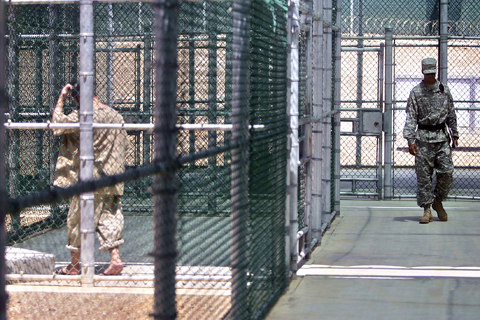Detainees at the Guantanamo Bay naval base were turned into “nomads” in order to keep them in a state of agitation and punish those who broke rules, a Sudanese journalist recently released from the US-run prison said on Friday.
Sami al-Haj said moving detainees between different camps and from cell to cell was part of an official policy to destabilize them.
“They were made into nomads,” the al-Jazeera journalist said, adding that detainees were moved around for three reasons.

PHOTO: AP
“There was a policy of the camp administration to stop the detainees from feeling they were in a stable state, and therefore they kept the detainees in movement all the time, moving them from one camp to the other every week, every two weeks,” al-Haj said.
By moving detainees around, variously isolating them and then putting them back within talking distance of other inmates, authorities also attempted to gather information from conversations between detainees, he said.
“The aim of this movement was to learn things about the detainees by listening to different prisoners speak to each other,” al-Haj said.
“In certain camps there was the possibility to speak to each other. It wasn’t allowed, but it was possible. It was very much a police tactic to listen to us,” he said. “They knew that when one is deprived of contact and then one has the possibility to speak to others, one might say things.”
Al-Haj claimed that a second reason for moving detainees was to prepare them for interrogation.
Inmates would be rotated between cells every two hours for up to a month, he said, depriving them of sleep ahead of interrogations.
Al-Haj said he himself was subjected to this so-called “frequent flyer” program by guards acting on orders from the interrogators.
Finally, detainees were moved to separate cells when they breached prison rules.
Al-Haj described a cellblock named Romeo where inmates were placed in a cold room and stripped of all clothes except a pair of shorts.
Guards would frequently check on the detainees, making them move their limbs “to know you are alive,” al-Haj said. “They have the right to check you all the time. So they use this to disturb you, because they need all the people to follow the rules.”
US officials in Geneva could not immediately respond to the claims. Requests for comment sent to the US Defense Department in Washington received no reply.
On Tuesday, the current commander of the prison, Navy Rear Admiral David Thomas, said, “there is no unnecessary movement in and out of cells by detainees,’’ but would not comment on allegations that detainees were subjected to sleep deprivation before he took command on May 27.
Also See: [ HARDCOVER: Uk ] Guantanamo: a bay that will live in infamy

HISTORIC: After the arrest of Kim Keon-hee on financial and political funding charges, the country has for the first time a former president and former first lady behind bars South Korean prosecutors yesterday raided the headquarters of the former party of jailed former South Korean president Yoon Suk-yeol to gather evidence in an election meddling case against his wife, a day after she was arrested on corruption and other charges. Former first lady Kim Keon-hee was arrested late on Tuesday on a range of charges including stock manipulation and corruption, prosecutors said. Her arrest came hours after the Seoul Central District Court reviewed prosecutors’ request for an arrest warrant against the 52-year-old. The court granted the warrant, citing the risk of tampering with evidence, after prosecutors submitted an 848-page opinion laying out

STAGNATION: Once a bastion of leftist politics, the Aymara stronghold of El Alto is showing signs of shifting right ahead of the presidential election A giant cruise ship dominates the skyline in the city of El Alto in landlocked Bolivia, a symbol of the transformation of an indigenous bastion keenly fought over in tomorrow’s presidential election. The “Titanic,” as the tallest building in the city is known, serves as the latest in a collection of uber-flamboyant neo-Andean “cholets” — a mix of chalet and “chola” or Indigenous woman — built by Bolivia’s Aymara bourgeoisie over the past two decades. Victor Choque Flores, a self-made 46-year-old businessman, forked out millions of US dollars for his “ship in a sea of bricks,” as he calls his futuristic 12-story

FORUM: The Solomon Islands’ move to bar Taiwan, the US and others from the Pacific Islands Forum has sparked criticism that Beijing’s influence was behind the decision Tuvaluan Prime Minister Feletei Teo said his country might pull out of the region’s top political meeting next month, after host nation Solomon Islands moved to block all external partners — including China, the US and Taiwan — from attending. The Pacific Islands Forum (PIF) leaders’ meeting is to be held in Honiara in September. On Thursday last week, Solomon Islands Prime Minister Jeremiah Manele told parliament that no dialogue partners would be invited to the annual gathering. Countries outside the Pacific, known as “dialogue partners,” have attended the forum since 1989, to work with Pacific leaders and contribute to discussions around

END OF AN ERA: The vote brings the curtain down on 20 years of socialist rule, which began in 2005 when Evo Morales, an indigenous coca farmer, was elected president A center-right senator and a right-wing former president are to advance to a run-off for Bolivia’s presidency after the first round of elections on Sunday, marking the end of two decades of leftist rule, preliminary official results showed. Bolivian Senator Rodrigo Paz was the surprise front-runner, with 32.15 percent of the vote cast in an election dominated by a deep economic crisis, results published by the electoral commission showed. He was followed by former Bolivian president Jorge “Tuto” Quiroga in second with 26.87 percent, according to results based on 92 percent of votes cast. Millionaire businessman Samuel Doria Medina, who had been tipped